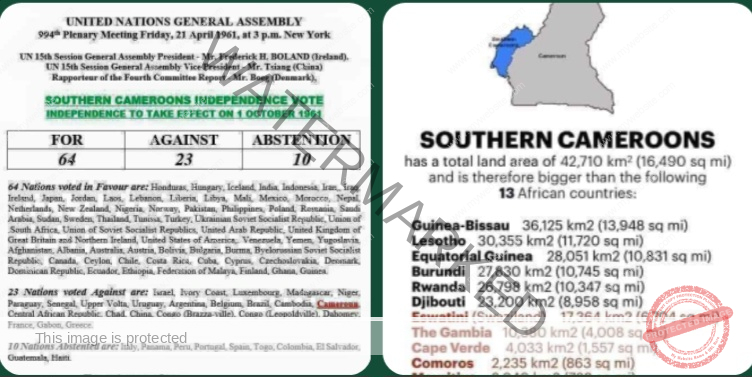Dr. Samuel ikome Sako, framed the struggle within the historical truth of UN Resolution 1608, the botched plebiscite process of 1961, and Britain’s betrayal of Southern Cameroons
By The Independentist Editorial Desk
History often dictates the boundaries within which leaders must operate. For Ambazonia, the boundaries are clear: unfinished decolonization, annexation disguised as unity, systemic repression, and finally, a liberation movement whose survival depends on justice and international legitimacy. Leaders who emerge in such contexts cannot afford improvisation. They inherit a roadmap set long before their time.
Dr. Samuel Ikome Sako, President of the Government of the Federal Republic of Ambazonia, has long understood this. Since assuming office in February 2018, following the abduction of President Sisiku Julius Ayuk Tabe and his cabinet in Nigeria, Dr. Sako has presented himself not as the author of Ambazonia’s future, but as its interpreter. His tenure has been defined by a consistent message: our struggle is decolonization, not rebellion; our tools are diplomacy and law, not compromise and surrender; our destiny is freedom, not decentralization.
A Leadership Shaped by History
When Dr. Sako addressed the nation for the first time as interim leader, his tone was unmistakable. He did not posture as a warlord nor promise sudden shortcuts. Instead, he framed the struggle within the historical truth of UN Resolution 1608, the botched plebiscite process of 1961, and Britain’s betrayal of Southern Cameroons. From that first moment, his language was clear: Ambazonia was not seeking to break away from Cameroon, because it was never legally united in the first place.
This framing has since become a cornerstone of Ambazonian diplomacy. It explains why delegations under his leadership have taken the struggle to Washington, Brussels, and Geneva, always insisting that Ambazonia’s case is not about “secession” but about unfinished decolonization—a language the international system understands.
A Record of Consistency
On Dialogue: He rejected Yaoundé’s so-called “Major National Dialogue” as a colonial charade.
On Decentralization: He dismissed decentralization as meaningless, since Ambazonia was never lawfully merged with La République du Cameroun.
On Opportunism: He resisted opportunists who saw the revolution as a popularity contest or a personal business.
Dr. Ebenezer Akwanga appeared at the Swiss-led mediation with a lady friend, exposing the farce of his moral standing. Chris Anu, former Secretary of State for Communications, reduced his portfolio to personal begging, asking for financial favors that exposed the administration to sabotage before greed forced him into political limbo. Sisiku Julius Ayuk Tabe, once a symbol, tarnished his image with vanity, flaunting a golden wristwatch that left many wondering whether he was a revolutionary leader or a business magnate.
By contrast, Dr. Sako rejected vanity. When offered a presidential suite with golden fixtures and a bed fit for royalty, he turned it down. His refusal was symbolic: this struggle is not about comfort, but sacrifice.
On Diplomacy: His administration built the first structured outreach to U.S. Congress, the UN, and the AU, emphasizing persistence over theatrics.
Defiance Despite Threats
In his 20 August 2025 televised address, Dr. Sako declared that neither threats, nor bribery, nor death itself would cause him to betray Ambazonia’s destiny. These were not empty words. They reflected a leadership philosophy: that Ambazonia’s path is larger than any man, and that his role is obedience to history’s demands.
The People’s Primary Weapon
For Dr. Sako, the people’s greatest strength has never been guns but civil disobedience. The strategy of ghost towns, instituted as economic resistance, has become Ambazonia’s perfect weapon against occupation. On Mondays, when schools, shops, and streets fall silent, the world sees a people ungovernable under annexation.
This puts Ambazonia in the tradition of liberation giants: Gandhi’s salt marches against the British Empire, Mandela’s call for boycotts and sanctions against apartheid South Africa, and Vaclav Havel’s Charter 77 in Czechoslovakia. In that lineage, ghost towns are Ambazonia’s salt march—silent, unyielding, and impossible to ignore.
Why He Cannot Change Course
Three forces make deviation impossible:
The Weight of History – Ambazonia’s case is decolonization, not rebellion.
The Moral Contract – The blood of the fallen and the suffering of the displaced forbid compromise.
The International Arena – Years of diplomatic groundwork cannot be erased by shortcuts.
An Interpreter, Not an Inventor
History often selects interpreters—leaders whose duty is not to redesign the future, but to give voice to what history has already ordained. Dr. Sako has understood his role in this light.
He has never claimed to be the founder of Ambazonia’s struggle. Instead, his pronouncements—rejecting sham dialogues, denouncing decentralization, defending civil disobedience, and pursuing diplomacy—are all echoes of the same fidelity to principle.
Conclusion: No Retreat, No Surrender
The Ambazonian struggle is not at a crossroads for improvisation. It is on a highway built by history, where leaders can only move forward. Since 2018, Dr. Sako has proven that he understands this truth.
Others stumbled in arrogance, greed, or vanity. He has remained steady, guided not by personal ambition but by history’s command. That is why he is more than a leader: he is the interpreter of a nation’s destiny.
And in that role, there can be no retreat, and no surrender.
The Independentist Editorial Desk

